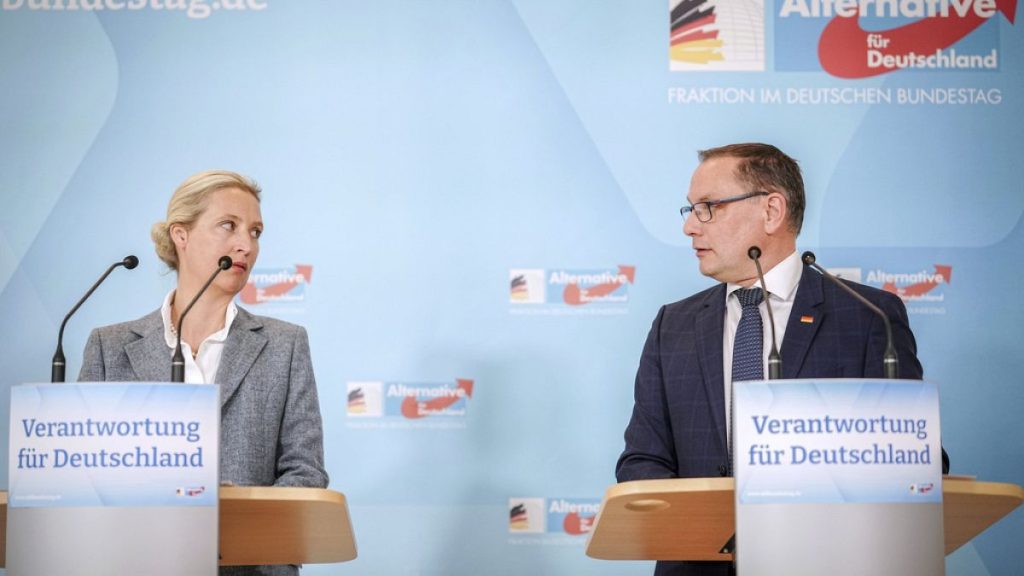Germany’s far-right AfD party recently launched its European Parliament election campaign in Donaueschingen amidst controversy. The party, seeking to regain momentum, faced setbacks such as the absence of lead candidate Maximilian Krah, who was unable to attend due to his employee’s arrest on espionage charges linked to China. Despite these challenges, AfD members remained optimistic, with party leaders accusing opponents of employing undemocratic tactics to hinder their efforts. The campaign launch was met with an anti-right protest rally in Donaueschingen, where demonstrators used slogans referencing the Nazi era to express their disapproval of the party.
The launch of AfD’s campaign comes at a time when the party is experiencing a decline in public support, exacerbated by recent events. The arrest of an assistant to lead candidate Maximilian Krah on espionage charges and allegations of another prominent figure, Petr Bystron, receiving funds from a website connected to the Kremlin have further complicated the party’s position. Despite these challenges, AfD’s co-leader Tino Chrupalla remained resolute, emphasizing the party’s stance against migration and criticizing the ruling coalition’s policies. The event specifically targeted the Greens, with attendees showing enthusiastic support for AfD’s nationalist platform.
The campaign launch in Donaueschingen coincided with a rival Social Democratic Party (SPD) gathering led by Chancellor Olaf Scholz, highlighting the political division within Germany. The absence of lead candidate Maximilian Krah was noticeable, but AfD members remained upbeat, expressing gratitude for his contributions and denouncing efforts by opponents to undermine the party. The event was met with an anti-right protest rally in Donaueschingen, where demonstrators used slogans such as “Real women hate AfD” and “We want it colorful not brown” to convey their disapproval of the party’s far-right ideology.
Despite facing controversies and declining poll ratings, AfD’s campaign launch in Donaueschingen aimed to energize supporters and showcase the party’s core message. Party leaders emphasized their opposition to migration and criticism of the ruling coalition’s policies, particularly targeting the Greens and Foreign Minister Annalena Baerbock. The event drew enthusiastic responses from attendees keen to rally behind AfD’s nationalist platform, highlighting the polarization within German politics. Despite challenges, AfD remains determined to make an impact in the upcoming European Parliament elections.
In the face of setbacks and controversies, Germany’s far-right AfD party launched its European Parliament election campaign in Donaueschingen with a focus on regaining momentum and energizing supporters. Despite the absence of lead candidate Maximilian Krah and recent allegations of espionage and Kremlin connections among party figures, AfD members remained undeterred. The event was marked by an anti-right protest rally and accusations of undemocratic tactics employed by opponents to undermine the party. AfD’s campaign launch highlighted the party’s core message against migration and criticism of the ruling coalition, particularly targeting the Greens and drawing enthusiastic responses from attendees in support of its nationalist platform.
Overall, AfD’s EU election campaign launch in Donaueschingen reflects the ongoing political division within Germany, with the far-right party facing challenges and controversy. Despite declining poll ratings and recent setbacks, including the absence of lead candidate Maximilian Krah and allegations of espionage and Kremlin connections, AfD remains steadfast in its message against migration and criticism of the ruling coalition’s policies. The event was met with an anti-right protest rally and accusations of undemocratic tactics by opponents. Despite these challenges, AfD’s campaign launch aimed to energize supporters and showcase its nationalist platform, drawing enthusiastic responses from attendees eager to rally behind the party.













